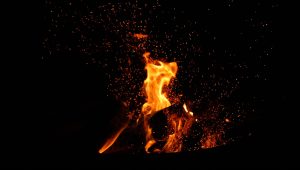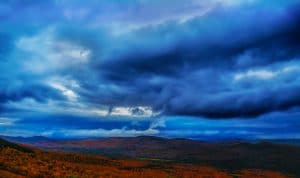O Lord, our Sovereign, how majestic is your name in all the earth. You have set your glory about the heavens. Out of the mouths of babes and infants you have founded a bulwark because of your foes, to silence the enemy and the avenger. When I look at your heavens, the work of your fingers, the moon and the stars that you have established, what are human beings that you are mindful of them, mortals that you care for them? Yet you have made them a little lower than God, and crowned them with glory and honor. You have given them dominion over the works of your hands; you have put all things under their feet, all sheep and oxen, and also the beasts of the field, the birds of the air and the fish of the sea, whatever passes along the paths of the seas. O Lord, our Sovereign, how majestic is your name in all the earth!
Psalm 8
It was over 3000 years ago when some ancient scribe recorded the Psalmist asking this question: When I look at your heavens, the work of your fingers, the moon and the stars that you have established, what are human beings that you are mindful of them, mortals that you care for them? Over 3000 years ago in a world so vastly different from the one we inhabit here in 2021.
Imagine someone, anyone really, sitting outside their tent on a clear, cloudless night and finding themselves surrounded by the multitude of stars overhead in a sky unpolluted by power plants or exhaust from millions of automobiles. Perhaps that Psalmist sat in the midst of the dark and lonely desert or on the edge of an oasis far from any town where there was nothing but sand and sky; and they simply looked up into the heavens and out into the darkness and realized how insignificant they were. And without really thinking, simply asked: Who are we? Who am I, wandering here in the desert, vulnerable to the elements, the wild animals and any one of a myriad other dangers that lurk just beyond the thin sliver of light that glows from a campfire.
Who are we? These words have bounded through the ages and passed through all of our lives again and again through the words of the Psalmist and from deep in our hearts. Who are we? Over the past 10 years or more it is this question in particular that has pushed and pulled at me more and more insistently. From the day a friend e-mailed some pictures from the Hubble telescope not long after it was repaired, I have pondered and prayed more fervently to have some sense of who we are as human beings. Who are we, small spots in the universe? We, who can ponder and wonder at all that is around us and in us and beyond us?
Who are we, small spots in the universe? We, who can ponder and wonder at all that is around us and in us and beyond us?
Who are we? It was this question that drew me to the doctor of ministry program in science and theology at Pittsburgh Seminary. It is this question that compels all sorts of theologians and scientists to explore what makes us who we are. And I admit right up front that I don’t really know very much, and I certainly don’t see myself as someone who has the answer to this question. But I see myself as a seeker of wisdom, as so many others hearing the author of Proverbs (chapter 2) tell us that “if we indeed cry out for insight and search for understanding . . . then we will find the knowledge of God . . . and we will understand righteousness and justice and equity, every good path for wisdom will come into our hearts and knowledge will be pleasant to our souls.” With those words on my lips and the question in my heart, I seek to better understand who it is we are as human beings in this vast universe.
Here in this 21st century, there are two important avenues that we must use to even begin to understand who we are as human beings on a small blue planet situated in the midst of a vast, perhaps unlimited universe: science and theology.
Theology is the discipline that guides our thinking about God, ourselves, and our relationship to God, to one another, and to the world. “Theology reflects upon the language and concepts of faith. Natural science is our ordered thought about creation. It deals with the physical world, that of the heavens and the earth, including plants, living creatures and ourselves in relationship to our earthly and cosmic environment. Science is our attempt to know and order nature.” These two definitions are guided by a Presbyterian paper written for the General Assembly in 1982 entitled The Dialogue Between Science and Theology. And so, as we can see, this dialogue isn’t a brand new interest in the church.
But it would seem that the conversation is bubbling up all around us. Entire issues of the Presbyterian Outlook and other religious publications have focused on this topic over the past several years. In 2009, the Vatican invited scientists from many disciplines to discuss the theological implications of the possibility of life on other planets. Cable television gives us the Discovery Channel, and public media outlets bring us Nova and other programs which talk about science and its meaning for our lives. NASA and its scientists have filled our lives with wonder since July 20, 1969, when Neil Armstrong first stepped on the moon. Think about it . . . 1969 . . . It has been over 50 years since that day. I certainly remember sitting around our basement television with my cousins who just happened to be visiting, and we were awed and excited and proud of that accomplishment. That is what science brings to us in many and varied ways every day. From ice cubes to penicillin, from automobiles to computers, from the heat which warms our sanctuaries to the microphones which makes it easier for everyone to hear–our 21st century daily lives are made possible by science.
As you read this, there are men and women orbiting the planet inside the space station some 250 miles above the earth. They conduct experiments which make a difference for our planet today and for the future, including the best way to recycle water–all the water available–and this same recycling equipment is now used in places around the globe where water is scarce.
We can see that as science asks who we are, it especially addresses the questions of how, why, and what. Why is the world the way it is? How does gravity work? How do we get from point A to point B? How many cells are needed to make a puppy, a bird, a person? What makes oxygen different from hydrogen? How can we split the atom? And so on and so forth. And science may answer these questions and many, many more!
But science does not answer the questions of “How do we make meaning in our lives?” or “To whom are we connected?” or “Why do we matter?” These are the domain of theology, religion, and faith. We will continue this discussion in Part II…
Reality Changing Observations:
1. What recent scientific discoveries or inventions have brought you a sense of wonder?
2. What recent scientific discoveries or inventions have helped you understand yourself, humanity, and/or God better?
3. How can we bring a love, appreciation, and reverence for science into our daily lives?





